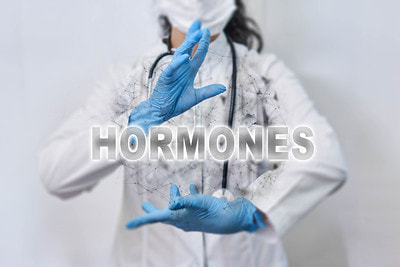My thoughts on testosteroneI spent many paragraphs in my last post talking all about estrogen and progesterone. So now it's time I spend a little time highlighting testosterone. Before I dive in, my warning for this message is that by virtue of talking all about testosterone, I will again be talking about reproductive organs and sexual function. Specifically. In depth. So now you've been warned. First up, let me dispel the common myths.#1 Testosterone is not addictive. The FDA does classify it as a controlled substance (which involves extra rules around prescribing, refills, and monitoring), but it is not addictive. Other prescriptions that are controlled substances do have the potential for creating addictions (such as opioids), but testosterone is not one of them. They just all got thrown in the same "control level" bucket. #2 Erectile dysfunction (ED) does not always mean low testosterone. One potential sign of low testosterone can be low libido (sexual interest, arousal) and/or ability to get or maintain erections for penis-owners, but it's no guarantee. I do run hormone panels on all patients with symptoms that are potentially influenced by hormone levels, but not every case of ED is due to low testosterone. And even for those who do experience ED, have low testosterone levels, and are on testosterone-replacement therapy, not all cases of ED respond to higher testosterone levels. Well, then, what gives?Bodies are complex. Hormones are complex too, and while many of my patients may be forgiven for thinking that I believe that every possible condition is always due to hormonal dysfunction, that's just not the case. Hormones are important, hormone deficiencies can wreck someone's quality of life, but not everything is due to low hormones. ED included. There are many other systemic health factors that influence the hormonal and vascular health of penises. Cardiovascular disease, diabetes, and peripheral vascular diseases are just a few other potential causes of ED. If you are concerned about ED your doctor should not just be checking your testosterone level. There is a lot more to investigate. Testosterone: not just for menTestosterone is an absolutely critical hormone for everyone. I work with many patients to restore their testosterone to levels that work better for them and their quality of life. That list includes cis-gender men, cis-gender women, trans-gender men and gender-diverse folks. Low testosterone levels can impact pretty much anyone's quality of life. Testosterone gets caricatured as just important for body-builders, libido and erections, but its effects are so much further reaching than just that. Testosterone is important for mood health, a sense of vitality, well-being, energy, and motivation. I have lost track of the number of patients who report that, "I just feel better. I feel like myself again" once low testosterone levels are addressed. Often, low testosterone levels feel blah. Blah mood. Lowish energy. Exercising regularly but feeling like no matter what you do, you never progress, never get stronger. Feeling totally apathetic. No interest in things that someone previously derived joy from, whether that is hobbies, physical activity, or sex. It's a very important hormone in helping us feel good. Testosterone is also a vital anabolic hormone for our musculoskeletal system. That means it's a signal that tells our bodies to build more cartilage, ligament, tendon, and muscle tissue. Those messages are essential when healing from an accident, injury, or surgery. But they're also critical in maintaining adequate muscle and cartilage levels as we age. Low testosterone levels are associated with muscle wasting (sarcopenia) and degenerative joint disease. Degenerative joint disease is also known as osteoarthritis, the most common type of arthritis. Often just attributed to "wear and tear," osteoarthritis is actually a very dynamic process that responds to our bodies' levels of nutrients, inflammatory levels, and hormones (among many other factors. Pick my brain at your next visit to chat more about this). Studies have shown that (cis)men in the lower percentages of testosterone develop more cases of osteoarthritis, they are more severe, and they eventually need total joint replacement surgeries earlier than their counterparts (same age) who have higher testosterone levels. Not abnormally high, just in the top-half of the normal range, rather than low-normal or pathologically low. What can I do on my own to support testosterone?Similar to the hormone support plan I mentioned last time, testosterone also benefits from paying attention to nutrition, hydration, physical activity, sleep, and stress levels. I won't rehash the entire message from last time. With testosterone, a focus on adequate protein levels is of particular importance. That, and providing your body with resistance activity so that it can use the testosterone (whether that's just what your body makes, or with the help of hormone supplementation) to build muscle fibers, vascular health, and support brain neurochemistry. The list goes on. But it all starts with resistance activity. Many, many types have been studied, and shown to have an immediate boost on research participants' innate testosterone levels. It seems that nearly any type of physical activity that pushes your body and makes your muscles work will do. That includes weight lifting, CrossFit and other high-intensity interval training options. Heck, even cutting wood boosts testosterone. I tell patients to move their bodies in ways that they enjoy. Some enjoy the camaraderie of a group fitness class. Others love getting out and rock-climbing in the great outdoors. Do what you enjoy, and add a little challenge if you feel you need it. I have low testosterone. Do I have to do shots? There is no type of testosterone treatment that is mandatory. Even if you have low testosterone, you do not have to do anything about it. That being said, you may want to. As mentioned previously, testosterone levels affect quality of life: mood, energy, libido, physical performance, sexual interest and function. So, for those reasons, a testosterone replacement trial is often begun. And that is just what it is. A trial. Not required. We're just seeing if increasing low testosterone levels improves the reasons that brought someone in to see me in the first place (or maybe these were concerns brought up later on). Vagina-owners who are seeking improvement in their quality of life, but not the masculinizing effects of testosterone do not get shots. Often a cream containing the testosterone prescription is used. Any testosterone prescriptions for this category of patients are compounded. That means we must use a compounding pharmacy. Your typical commercial pharmacy (Rite-Aid, Walgreens, etc.) does not have any type of testosterone appropriate for these patients. I could go into a whole tirade about how that's due to the fact that our medical establishment doesn't recognize testosterone as being important for my female patients, but I'll leave it at that. For penis-owners and/or those looking for masculinizing effects of testosterone, 99% of the time we do just injections (which are available from commercial pharmacies). There are other options out there (primarily creams and gels), but they come with quite a few down-sides, so often shots are the way we go. Injecting yourself can be scary for anyone who's never done it, but with a few tips, and a bit of practice, it is a breeze for most everyone. I have given thousands of injections to patients, I have injected myself many, many times, and I am happy to show anyone the self-injecting ropes when need be. Then what happens?Well, the effects of the testosterone kick in. Some people notice an effect very quickly, within the first few days. By and large all these hormones we've been talking about (estrogen, progesterone, and testosterone), when replaced, tend to build up in someone's system over the first few weeks. I often check in with patients about a month out, to make sure positive effects are being seen, make any dosage changes necessary, and address any unwanted effects that may arise. Monitoring involves rechecking labs usually a few times in the first year of replacement, and annually in the future if no changes are being made. These are necessary to verify accurate testosterone dosage, long-term safety, and check for aberrant hormone metabolism (some will break down too much of their testosterone into estrogen, which can create secondary issues). Additional requirements of testosterone replacement therapy are continuing annual exams, and following any further recommendations given such as PSA monitoring and urologist visits. These are no longer recommended annually as a general rule for all (cis) men who are on testosterone; I leave that up to the discretion of the primary care provider. Again, no aspect of this is mandatory. For those who have low testosterone, and choose replacement, the timeline on replacement is up to them. We are talking about addressing impacts to one's quality of life, not any medically unsafe situation that absolutely requires medicating. Testosterone replacement, like any hormone prescription, works for the duration that someone uses it. Our bodies change over time. Obviously. And along with that comes changes in what hormone levels are "expected" (as in, hormone deficiency symptoms arise when levels are below that). So any hormone plan I craft with a patient is always tailored to fit them, their initial concerns, their response, and their continued need for the hormone. When should you reach out? Whenever you need more support, of course. Whenever your current plan is not working for you. Whenever you need new ideas, new investigation, new treatment suggestions. I am pretty good at brainstorming. Through my decade of practice, and doing so much hormone testing, prescribing, and problem-solving through that time, I nearly always have a Plan B. And Plan C. And Plan D, E, F, etc. Don't settle for a plan that isn't working for you. That's all I have for todayI hope that this has been helpful for those who have gone the route of testing and prescribing, for those who are curious, for those who have been told maybe they should pursue that route, and also I hope this was helpful even for those who are very hormone-wary. I welcome all questions and concerns as I am working through hormone investigation with my patients.
Next time I'm going to cover the weight loss injection medications. Ozempic. Wegovy. Semaglutide. I was naive enough to think that I could just ignore this huge trend in medicine, but I can no longer. So I will dive into my thoughts on the whole debacle around these medications, use, side effects, long term safety, and more. I won't be able to hold back from bringing out my soapbox on the larger topics of anti-fat bias - in medicine, in society, in our own mindsets. I'm sure it will end up being quite the novella. So stay tuned for that. If you wish. Yours in health, Dr. Angela Cortal
0 Comments
Leave a Reply. |
Archives
June 2024
Categories
All
|
about the doc |
patient infocontact |
|
Privacy Policy
© Copyright 2011-2024, Dr. Angela Cortal ND LLC website content is for educational purposes only and is no substitute for medical advice (see the Terms of Use Agreement for this site), you must establish a doctor-patient relationship to receive that! |



